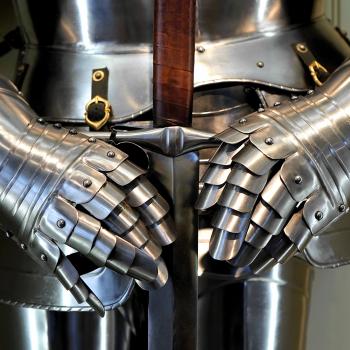To Train Up A Child, chapter 18 part 2
In my last post of this series I wrote about the first part of this chapter. Michael advised parents not to make their kids religious show-offs, and told the story of a time when he attempted to show off a trick he had taught his dog only to have the dog, distracted, fail to perform. Michael blamed himself for this embarrassing episode, and advised parents not to repeat his mistake. Today I want to follow up on this.
In 2009, researcher Robert Kunzman published Write These Laws Upon Your Children. One of the families Kunzman profiles is the Bransons; the parents, Gary and Lauren, are raising their ten children in the backwoods of Tennessee. To profile each family Kunzman visited them in person, spending several days with the family. At one point during his visit, Gary put this question to Kunzman:
“Are you familiar with Michael Pearl?”
“No, I don’t think so,” I say.
“Michael and Debi are the author of these books”—he points to a couple of titles on the table, To Train Up a Child and No Greater Joy. “We was neighbors. He’s the one that actually inspired me to homeschool. He was homeschooling his children when I met him, thirty years ago.” Gary’s tone grows animated.
The next day, Gary put on a demonstration:
“A year old is about when we start serious training with them. Like this: ‘Jessica, come.’”
Jessica, who has been playing with some toys in the corner, looks up. “Come over here,” Gary repeats in a stern voice. She gives a beautiful smile and serenely walks across the kitchen and stands next to him. “Sit,” Gary orders. There’s no open chair anywhere nearby, and the two-year-old remains standing next to him, smiling happily.
“Sit,” Gary repeats.
Lauren attempt to intercede: “She’s like, ‘Where do you want me to sit, Dad?’”
“Sit down,” Gary says. His tone is one of disappointment: “All right, see, she failed. Maybe it’s the strangeness of this arena, but that’s the point I make with all of them. Because you’re not in a training environment, it’s even more important for you to obey my voice.” Gary looks over at me and says, “I’m going to take advantage of this situation right now.” He turns back to his daughter: “Jessica, remember? When I say sit, you sit right then. No matter if you have a chair or anything.”
“Sit on the floor if you have to,” Stephanie advises.
Gary’s voice grows stern. “Jessica, go down to the den.” Jessica obediently walks back across the room toward the doorway. Before she gets there, Gary blurts out, “Stop!” Jessica stops. “Come!” Jessica turns and heads back to her father. “Sit.” She immediately sits on the floor, next to his chair. “All right,” Gary says approvingly. “Stand up,” he continues. Jessica rises. “Go in there and touch the living room door.” She begins to walk in that direction. “Run!” Jessica increases her pace. “Come!” She turns and goes back to her father. “Stop!” She halts in front of him. “Sit!” She sits again on the floor. “Stand up!” She rises again.
Gary turns to me. “Some of these liberal-type thinking people, you know, think that you’re creating mind-numbed robots out of your children. But they don’t understand the concept of trying to train your children in the way that they should go, training them to obey your voice.”
Would Michael have objected to Gary’s demonstration? It’s possible. I’m not so sure, though. Throughout his books Michael tells stories about how very truly obedient his children are in a way that reads very much like he’s showing off. Look what I can make them do! he boasts. Look how quickly they obey me and jump at my word! Here’s an example, from a passage earlier in Michael’s book:
Last winter, my two girls, nine and eleven, were riding with me in the old 4×4 Army truck. The gravel road was bumpy and rough. When I made a stop at an intersection, I heard the two, twelve-volt batteries, which are located right behind the seats, shortout and begin to arc. An explosion of spraying battery acid was potentially imminent. The girls understood none of this. However, when I said (this time in a raised voice), “Get out fast!” they didn’t ask, “Why?” I immediately got out on my side to run around and open their usually jammed door. As soon as I cleared the door on my side, I looked over my shoulder to see how they were doing. They were gone. The door was still closed, and the window, which also sticks, was only open about half way. But, they were nowhere in sight. When I got around to the other side, there they were piled up in the gravel road rubbing sore hands and knees. “How did you get out?” I asked. “Through the window,” they choked out. “Head first?” I asked. “You said get out fast,” was their accusing reply.
My son, who was driving another truck behind me, said, “I didn’t know what was happening. Suddenly they both came flying out the window head first and landed in the road.” I had trained them to jump upon command. They did. There may come a time when their safety or survival will depend on instant obedience.
The entire undercurrent of this passage is self-congratulatory. If Michael has never shown his kids’ obedience off to a friend or visitor, I would be very much surprised. Indeed, I wouldn’t wonder if Michael showed his children’s obedience off to Gary, when they were neighbors, and that’s how Gary ended up so impressed. If Michael intends to tell parents that they shouldn’t show off how obedient their children is, he needs to say it directly, because everything in his attitude toward his children would seem to suggest otherwise.
Michael cares so much about his kids making him look good, in fact, that he has repeatedly bragged that his children are all still in the fold, married and homeschooling their own growing families. That is no longer as true as it might once have been. A blogger recently noted a change in the biography sections on the No Greater Joy website—the entry on the Pearl’s oldest son, Gabriel, has been edited to remove his wife and children, with no explanation whatsoever. Whatever doesn’t make Michael look good, apparently, he will erase.
In this chapter, Michael advises only against creating religious show-offs. The examples he uses are of parents showing off via their children’s religious demonstrations, and the text underscores this focus. Let’s look at the next bit of the chapter:
I have had parents bring their little child in, stand him in front of me and say, “Say ‘praise the Lord’ for Brother Mike.” When he has finished his performance, everyone smiles and praises him. The parents grin as if they just heard the announcement that their dog had won the annual Frisbee catching contest. When little children are cute in their prayers or religious imitations they should be totally ignored. Otherwise you encourage hypocrisy. Never give them a ‘form of godliness.” It is a cheap trap to fall prey to schooling your children to appear ahead of their peers in religious devotion. You and your children are rewarded here and now; and that is all the reward such stage playing ever gets. “Verily I say unto you, they have their reward (Matt. 6:5).”
Why is Michael’s objection to parents showing off via their children so selective? Why only religious demonstrations? After all, Michael brags on his children’s obedience all the time. Here’s another passage from earlier in the book:
Even today, without looking at the children, I can snap my finger, pointing to the floor, and they all (including the ones over six-feet) immediately sit. I can point to the door, and they all take it.
See how awesome I am, Michael boasts. Even the ones over six feet still obey me instantly, at a snap of my fingers! This sort of showing off, this sort of boasting about your kids, apparently, is a-okay. I’m no psychologist, but Michael seems to get something out of his ability to make his children obey him, instantly and without question. It’s almost as if it feeds a need inside him, a need to feel in control of something. And then, of course, theres the need to broadcast that control to others, to show what a Big Man he is.
Let’s turn to the last section of the chapter:
One well meaning father has two children who sing fairly well. Every chance he gets, he captivates an audience to listen to their singing. Their gospel songs, sung by another, would be a blessing; but when sung in exhibition by self-centered children, it is a pain to endure. Their singing is so cute. As they parade back to their seats, he praises them, smiling like I would have been if my dog had only performed for me.
One time when the two singing “parrots” forgot the words and showed a little indifference to performing, the audience became restless, and the father became anxious. His act was falling apart. He coaxed and encouraged until I saw in him the same feelings I had toward my non-performing dog. Now the dog is not going to suffer from being paraded, but these children already are. The father’s ambition for himself and his children overrides his concern for their spiritual well-being. Or, maybe he doesn’t have the wisdom to discern the difference. Ruin comes easily in this Satanically controlled world.
Michael says these children’s songs would be “a blessing” if they’ weren’t “sung in exhibition by self-centered children.” I’m not sure how he can tell that they’re self-centered. While Michael is right that parents shouldn’t show off a child’s precocious (and learned) religiosity as a status-building exercise—and I do get a Toddlers and Tiaras vibe from his description—Michael is being a bit of an absolutist, both here and in advising parents to ignore their children (and I’m quite sure he was being literal) when they’re being cute. Why not talk about the importance of listening to children and supporting their interests without simply mapping your own onto them?
Perhaps the answer to my question—why Michael’s objection to parents showing off via their children is so selective—has to do with the root of his concerns. He objects to parents making religious demonstrations of their children because he believes this will make their children have shallow, selfish, appearance-oriented approaches to religion. Note that in the last example, with the singing, his concern was the children being self-centered. Perhaps there is no similar objection to demonstrations of obedience because in Michael’s mind children are supposed to have a formulaic approach to obedience, jumping when someone says jump.
For Michael, the problem isn’t actually using your children to make you look good. It’s throwing religion into that mix. Michael shows off his children’s robotic and formulaic obedience all the time, beating his chest proudly, but when other parents show off their children’s lisping “praise the lords” and gospel tunes, they’ve gone a bridge too far. Why? Because they risk making religion formulaic and automaton.
Whether or not it works out that way in practice, for Michael religious devotion is supposed to be from the heart. Not so obedience to parents. I’m reminded of various comparisons between parenting approaches. Should children obey their parents under fear of punishment? Or should they obey their parents because they trust their parents and know that their parents listen to them and take their needs into account?
This raises questions, though. Michael frequently argues that when parents require immediate and complete obedience of their children, they are preparing their children to tender immediate and complete obedience to God. But if formulaic religious devotion is a problem, why isn’t formulaic obedience to parents also a problem? If children’s religious beliefs should be individual, shouldn’t parenting be individual? If religious devotion needs to be from the heart, and not on command, shouldn’t obedience to parents be so also?
Or maybe I’m analyzing this too deeply. Maybe Michael’s teachings are simply fundamentally inconsistent and contradictory.
I have a Patreon! Please support my writing!















